Is your air conditioner not blowing cold air but running? You’re not alone. This issue can be very frustrating. As an HVAC expert and a user of the Trane XR16 Air Conditioner, I’ve experienced this myself. Sometimes, my Trane unit stops blowing cold air, even though it’s running.
Drawing from my professional experience, I’ll share how I fix this issue on my air conditioner and offer common solutions for other brands. These easy-to-follow tips will help you stay cool and comfortable, and you’ll know when it’s time to call for expert help.
Table of Contents
Refrigerant Issues for AC not Blowing Cold Air
Refrigerant problems are often to blame when your AC isn’t blowing cold air. As an HVAC expert, I’ve seen this in about 60-70% of inspections. Issues like leaks, low levels, or clogs can stop your AC from cooling. Let me share my experience and some simple solutions to help you fix this common problem.
Refrigerant Leak
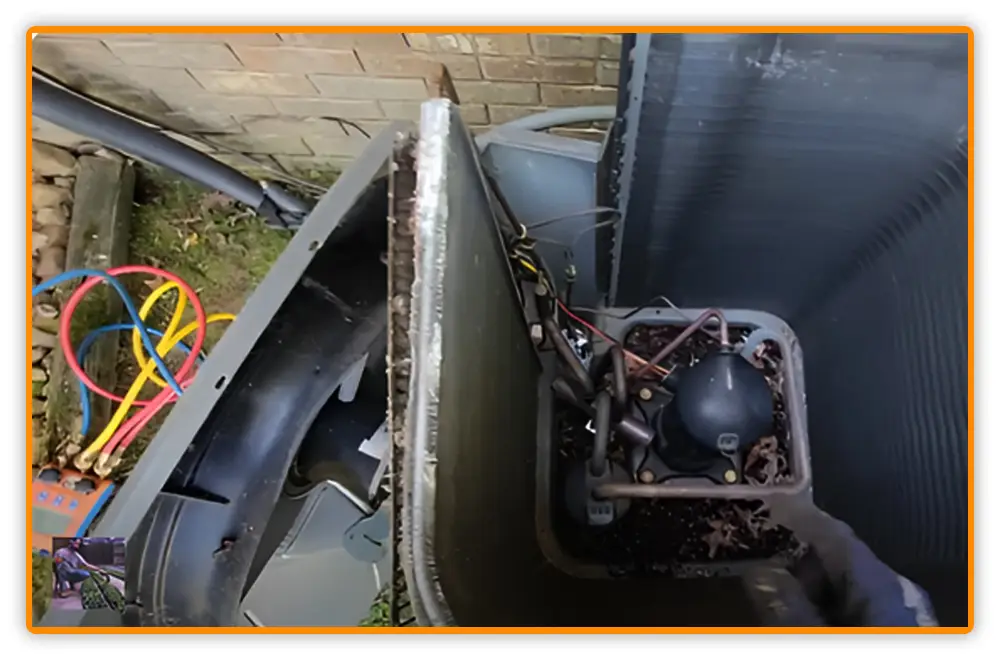
Refrigerant is what keeps your AC cool. It absorbs heat from inside your home and releases it outside. It doesn’t just vanish, so you shouldn’t have to add more often. But if there’s a leak, you will need to refill it after fixing the leak. Without enough refrigerant, your AC won’t cool properly.
Signs of a Refrigerant Leak: Here are some signs you can look for,
- Ice on the Evaporator Coil: Look at the evaporator coil for ice. I’ve seen this in many inspections. The coil absorbs heat from the air inside your home to cool it down.
- Wet Spots: Check for wet spots on the walls, floor, or outside of the vents. These could be signs of leaked refrigerant.
- Hissing Sound: If your AC makes a hissing sound, it could be a leak. Even if it cools a bit, it will take longer to cool your home, and the AC will work harder.
Impact on AC Performance: With a refrigerant leak, your AC won’t cool well. It might take longer to cool, use more energy, and leave some rooms warmer than others.
How to Fix: Fixing a refrigerant leak might look easy, but it’s usually not. Finding a leak can be simple, but you often need a professional to fix it. NATE (CHP-5) certified pros in the USA and Canada have the right tools and know-how to fix the leak safely and make your AC cool well again.
Low Refrigerant
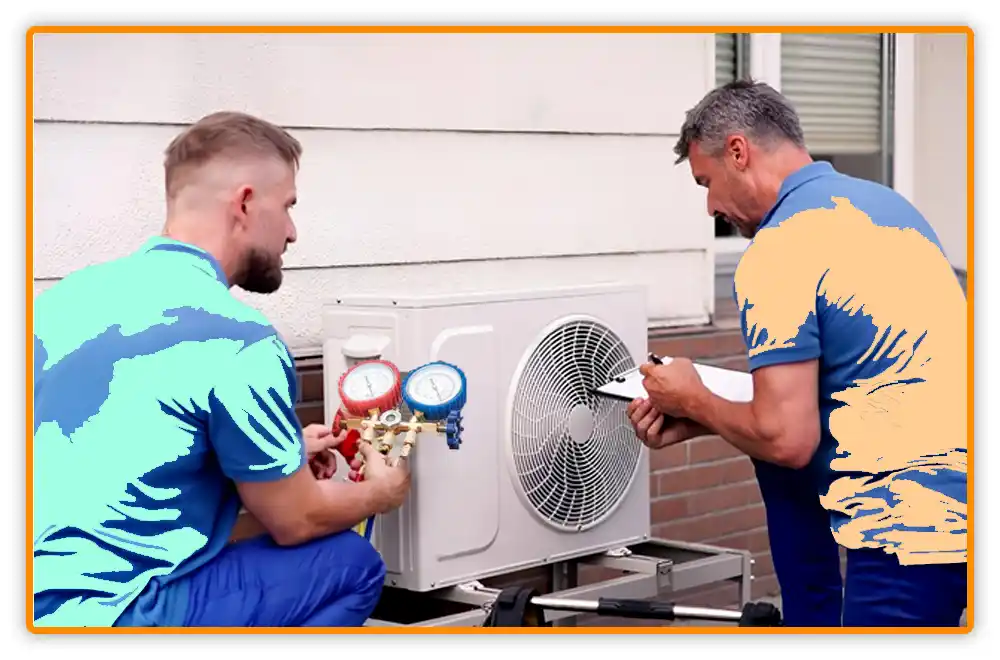
When your air conditioner is low on refrigerant, it struggles to cool your home. I’ve seen this happen not just because of leaks but also if the refrigerant wasn’t filled enough during installation or maintenance. Here’s what you need to know:
Causes of Low Refrigerant:
- Leaks: These are the most common causes.
- Insufficient Filling: Sometimes, not enough refrigerant is added initially or during maintenance.
- Natural Loss: A small amount can be lost over time or during routine check-ups.
Symptoms of Low Refrigerant: If your AC is low on refrigerant, it won’t cool your home as quickly or reach the set temperature. The air from the vents may feel less cold. You might also notice the compressor running more often and for longer periods, trying hard to cool without enough refrigerant.
Impact on AC Efficiency: Low refrigerant means your AC uses more energy to cool your home, which increases your bills. It can also wear out parts like the compressor faster, causing it to overheat and break down sooner.
How to Address Low Refrigerant: Fixing low refrigerant isn’t a DIY job. You need a professional with the right tools to check and fill the refrigerant properly.
I’ve seen firsthand how low refrigerant can affect an AC’s performance. It’s frustrating when your home doesn’t get cool enough, and you hear the AC working overtime. Getting a professional to check and fix the refrigerant level can make a big difference.
Thermostat issues for AC not Blowing Cold Air
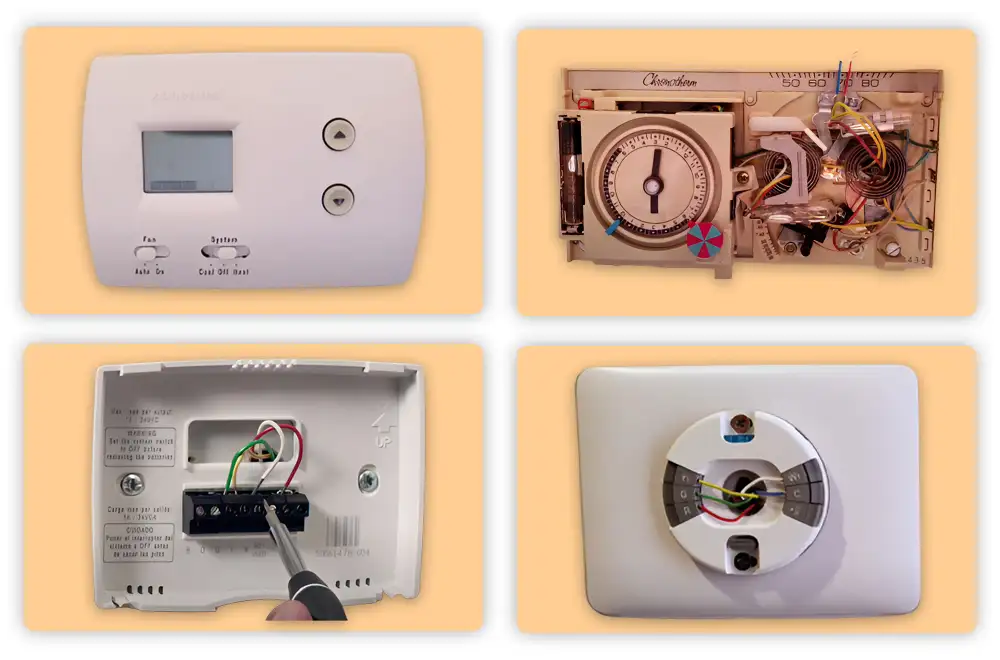
When your air conditioner isn’t blowing cold air, the thermostat could be the problem. As an HVAC expert, I’ve encountered many situations where a faulty thermostat was the culprit. Here’s what you need to know about thermostat issues and how to address them.
Causes of Thermostat Issues
- Incorrect Settings: Sometimes, the thermostat settings are wrong. It might be set to “fan” instead of “cool,” or the temperature might be too high. I’ve seen this often, and a quick check can fix it.
- Dead Batteries: If your thermostat uses batteries, they might be dead. Replacing them can solve the problem. I remember one visit where the AC wasn’t working, and it turned out to be dead batteries in the thermostat.
- Old or Faulty Thermostat: Over time, thermostats can wear out or malfunction. This can lead to incorrect temperature readings and poor AC performance. I’ve encountered many old thermostats causing issues that were easily fixed with a new model.
- Location of Thermostat: If the thermostat is in a spot that’s too hot or too cold, it might not read the room temperature correctly. This can cause the AC to not cool properly. I once found a thermostat placed next to a sunny window, which threw off its readings.
Symptoms of Thermostat Failure
- Inconsistent Temperature: If your home doesn’t stay at the set temperature or if it fluctuates, the thermostat might be at fault. I’ve seen this in many homes, and a simple thermostat adjustment often made a big difference.
- No Response from AC: If you change the thermostat settings and the AC doesn’t respond, there might be a connection issue. I remember one family during a heatwave discovering that their thermostat wires were loose.
- Display Problems: A blank or unresponsive thermostat display can indicate a problem. Once, a homeowner was frustrated with their AC until we found that the thermostat display had died. Replacing it fixed the issue.
How to Fix
Fixing thermostat issues can often be straightforward. Here are some steps you can take:
- Check Settings: Ensure the thermostat is set to “cool” and the temperature is correct. I’ve found many cases where a simple settings check solved the problem.
- Replace Batteries: If your thermostat uses batteries, try replacing them. Once, I visited a home where the AC wasn’t working. Replacing the dead batteries fixed everything.
- Inspect the Location: Place the thermostat in a central spot, away from sunlight or drafts. I once found a thermostat next to a sunny window, causing bad readings.
- Upgrade: If your thermostat is old or often breaks, think about getting a new one. Smart thermostats give better readings and control. I’ve seen many homes get more comfy and efficient with this upgrade.
Read More: Thermostat is Blank and AC Not Working
Air Filter Problems for AC not Blowing Cold Air
A clean filter helps your AC work well. If your AC isn’t blowing cold air, a dirty air filter might be one of the issues.
Dirty Air Filter
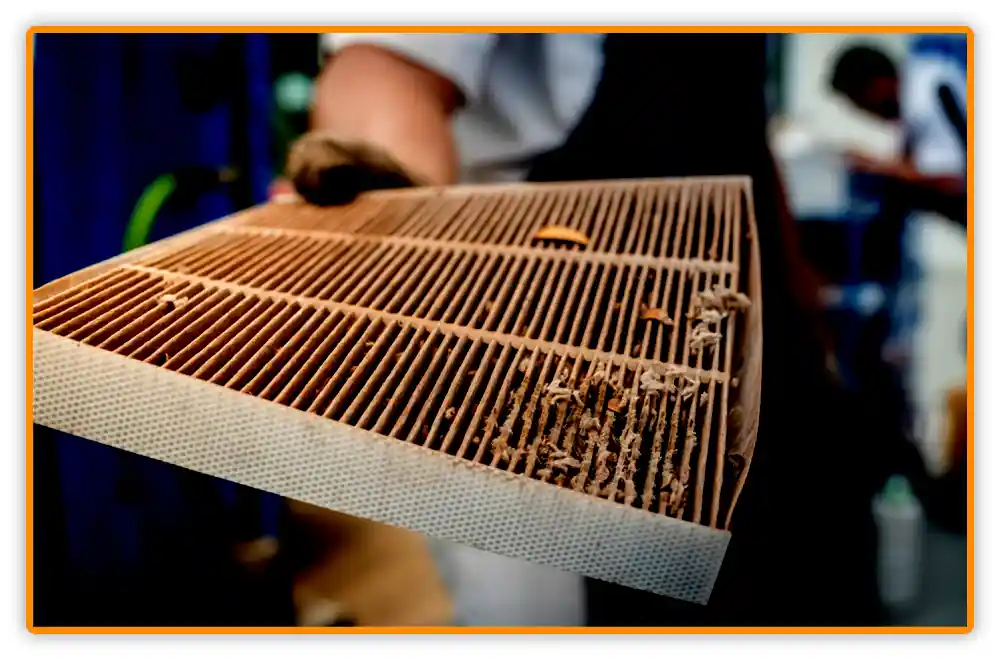
An air filter in an AC removes particles like dust from the air, making it cleaner to breathe. Dust and debris can build up on the filter and make it dirty. A dirty filter can block airflow and may cause coils to freeze. This happens along with other issues like low refrigerant or mechanical problems. When it’s clogged, your AC has to work harder to circulate air. This can lead to higher energy bills and less cooling.
I’ve often seen dirty filters cause big problems. Once, a client’s AC was barely cooling their home. I found their filter was so dirty it looked like it hadn’t been changed in a year! After replacing it, the AC worked much better.
To keep your AC running smoothly, check and clean your filter regularly. Change your AC filter every 2-3 months, or more often if you have pets, allergies, or live in a dusty area. I make it a habit to check my filter monthly because I have pets, and it makes a huge difference.
Compressor and Coil Issues for AC not Blowing Cold Air
The compressor and coils are essential for your AC’s cooling process. If these parts fail, your air won’t be cold.
Frozen coil
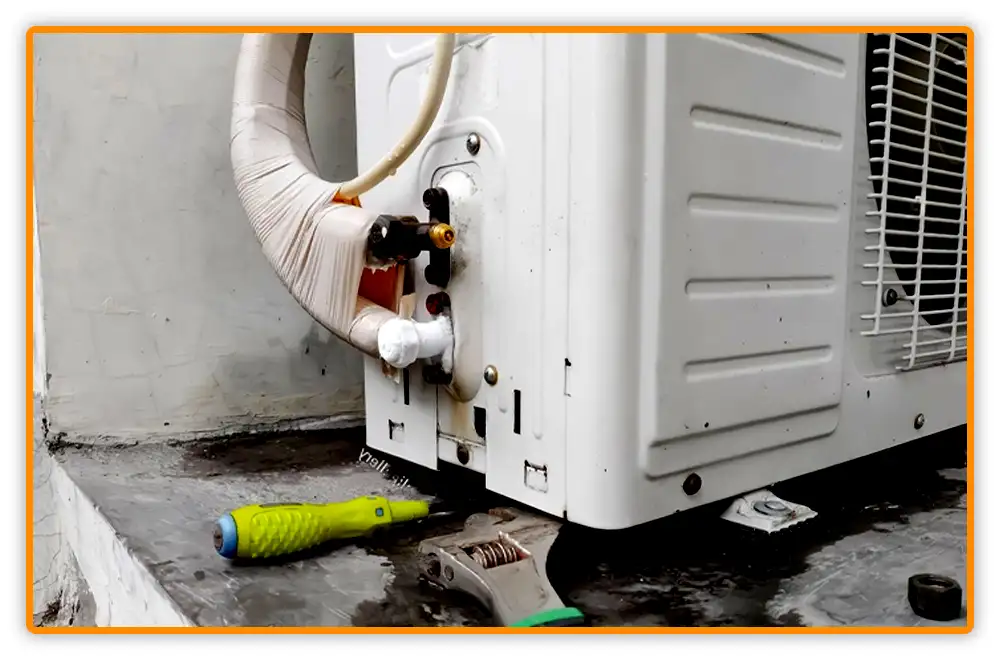
If your air conditioner is on but not cooling your house, it might be because the evaporator coil is frozen. I encounter this problem in about 10-15% of my work.
Why Do Coils Freeze?
Coils in your AC can freeze for several reasons:
- Dirty Air Filters: Clogged with dust, they restrict airflow, making the coil too cold and icy. I once found an AC with a filter so dirty it looked like a blanket. After replacing it, the coil thawed and worked perfectly.
- Low Refrigerant Levels: Low refrigerant lowers pressure and causes freezing. Once, a client’s AC wasn’t cooling due to a tiny refrigerant leak. Fixing the leak and refilling the refrigerant solved the problem.
- Poor Circulation: If the fans don’t work right, air doesn’t move well, leading to more freezing. I’ve seen fans fail, causing the coil to freeze solid. A quick fan repair can prevent this.
Prevention Tips for Frozen Coil
- Change or Clean Air Filters: Do this every 1-3 months. I always tell my clients to set a reminder because clean filters keep your AC running smoothly.
- Professional Check and Refill: Get a professional to check and refill refrigerants once a year. I’ve seen yearly checks catch small issues before they become big problems.
- Regular Maintenance: Regularly check that fans and other parts are working well. Preventative maintenance can save you a lot of trouble.
If You Think Your AC Coil Might Be Frozen, Try These Steps:
- Check Airflow: Look for blockages in filters and vents, and clean or change filters if needed. Once, a client had blocked vents causing poor airflow, and cleaning them fixed the issue.
- Inspect the Coils: See if there’s ice on the evaporator coil and nearby areas. Ice is a clear sign that something is wrong.
- Check the Thermostat: Make sure it’s set right and working well. I’ve found that sometimes, the thermostat setting is the simple fix.
To Safely Thaw a Frozen Coil:
- Turn Off Your AC: Prevent further ice buildup by turning off the cooling function.
- Switch to Fan Mode: Turn on just the fan to gently blow warm air over the coils and help thaw them.
- Wait and Monitor: Allow the ice to melt naturally. This process can take several hours, so be patient. I remember one instance where the coil took overnight to fully thaw, but the AC worked perfectly the next day.
These tips come from my hands-on experience and can help you keep your AC running smoothly. A frozen coil can be a hassle, but with these steps, you can handle it and keep your home comfortable.
Bad Compressor
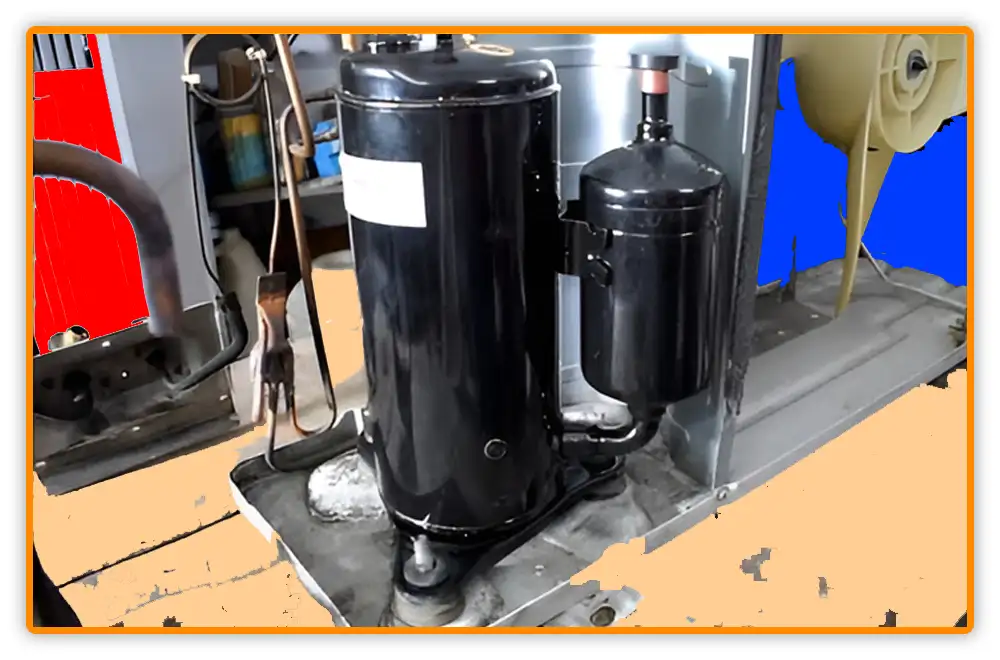
A bad compressor can cause your air conditioner to stop blowing cold air. The compressor is the heart of your AC system, circulating refrigerant to cool your home. When it fails, the entire system can suffer.
Symptoms of a Bad Compressor
- No Cold Air: If your AC isn’t blowing cold air, the compressor might be the issue. I’ve seen this many times, and it’s always frustrating for the homeowner.
- Strange Noises: Grinding, clunking, or rattling noises from the outdoor unit can indicate a compressor problem. I once had a client who heard a loud banging noise, and it turned out the compressor had failed.
- AC Won’t Turn On: If the AC doesn’t start, the compressor might be to blame. I’ve encountered units that wouldn’t turn on at all due to a faulty compressor.
Causes of Compressor Failure
- Lack of Maintenance: Regular maintenance is key. I’ve seen compressors fail from lack of proper care.
- Overheating: Overheating can make the compressor fail. Once, a client’s unit was in direct sunlight with no ventilation. It overheated and broke down.
- Electrical Issues: Wiring or electrical issues can harm the compressor. Once, I found a client’s compressor failed due to a power surge damaging the electrical system.
Prevention Tips for Compressor Issues
- Regular Maintenance: Schedule yearly maintenance checks to keep your compressor in good shape. I always stress the importance of regular check-ups to my clients.
- Proper Ventilation: Make sure the outdoor unit has good airflow and isn’t in direct sunlight. Proper placement stops overheating.
- Monitor Electrical Systems: Keep an eye on your AC’s electrical components. Surge protectors can help prevent damage from power surges.
How to Fix a Bad Compressor
Fixing a compressor is not a DIY task. Here are the steps you should take:
- Call a Professional: If you suspect a bad compressor, call a professional HVAC technician. They have the tools and expertise to diagnose and fix the problem.
- Consider Replacement: Sometimes, replacing the compressor is more cost-effective than repairing it. I’ve advised many clients to replace their compressors to save on long-term costs.
- Upgrade if Necessary: If your AC unit is old, it might be time for an upgrade. Newer models are more efficient and reliable.
From my experience, dealing with a bad compressor can be tough, but with the right steps, you can fix your AC and keep your home cool. By sharing these insights, I hope to help you understand and solve compressor issues better.
Blocked Condenser Coil
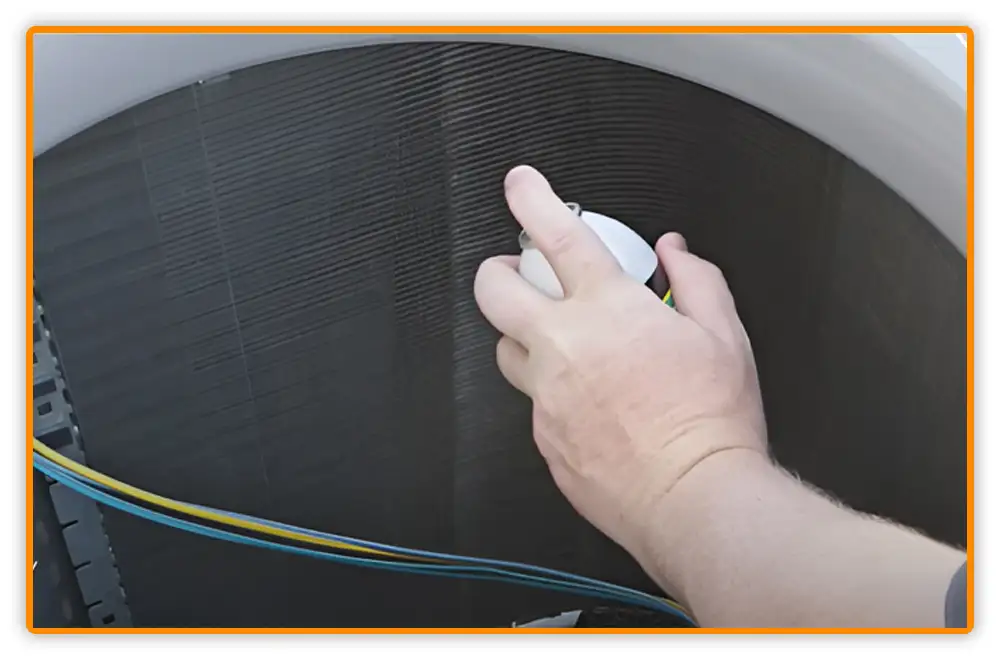
The condenser coil is in the outdoor part of your air conditioner. It pushes the heat from your home out into the air. If this coil gets covered with dirt, debris, or leaves, it can’t get rid of the heat properly. This makes your air conditioner work harder, cool less efficiently, and could even cause it to overheat.
Common Signs of a Blocked Condenser Coil
- Your air conditioner is on, but it’s not cooling well.
- The outside unit gets very hot.
- You might also notice your energy bills are higher than usual.
Prevention and Maintenance Tips for Blocked Condenser Coil
- Regular Checks: Check the area around the condenser unit often. Clear away any leaves, dirt, or debris that could block the coil. I always make it a point to inspect my own unit monthly, especially during the fall when leaves are everywhere.
- Clear Surroundings: Cut back any plants or shrubs to make sure there is at least 2 feet of open space around the condenser unit. In one of my client’s homes, trimming back the bushes around the unit drastically improved their AC’s performance.
- Gentle Cleaning: Use a gentle water spray to clean the coils, being careful not to bend or damage the fins. I remember showing a homeowner how to do this safely, and it became part of their regular routine.
DIY Maintenance Guidance for Blocked Condenser Coil
- Turn Off Power: Turn off the power to the AC unit to ensure safety.
- Remove Debris: Gently remove any large pieces of debris by hand. I often find twigs and leaves stuck in there.
- Spray Coils: Use a garden hose to spray the coils, aiming the water stream straight through the fins, not at an angle. This is crucial to avoid damaging the fins.
- Inspect and Straighten Fins: After cleaning, inspect the fins for any signs of damage or bending. If necessary, use a fin comb to straighten them out. I once helped a neighbor with this, and it made a noticeable difference in their AC’s efficiency.
When to Call a Professional for Blocked Condenser Coil
- If cleaning the condenser coil doesn’t improve the AC’s cooling.
- If you find damaged fins or other problems that might need more detailed repair.
In my experience, keeping the condenser coil clear and clean is key for your AC’s efficiency. Regular checks and simple maintenance can stop bigger problems and keep your home cool and comfy. If you’re unsure or if the problem continues, call a pro. They have the tools and know-how to handle more complex issues.
AC Unit Obstructions for not Blowing Cold Air
If your AC isn’t blowing cold air, check for blockages like leaves or dirt around the unit which can stop it from cooling properly.
Clogged Drain
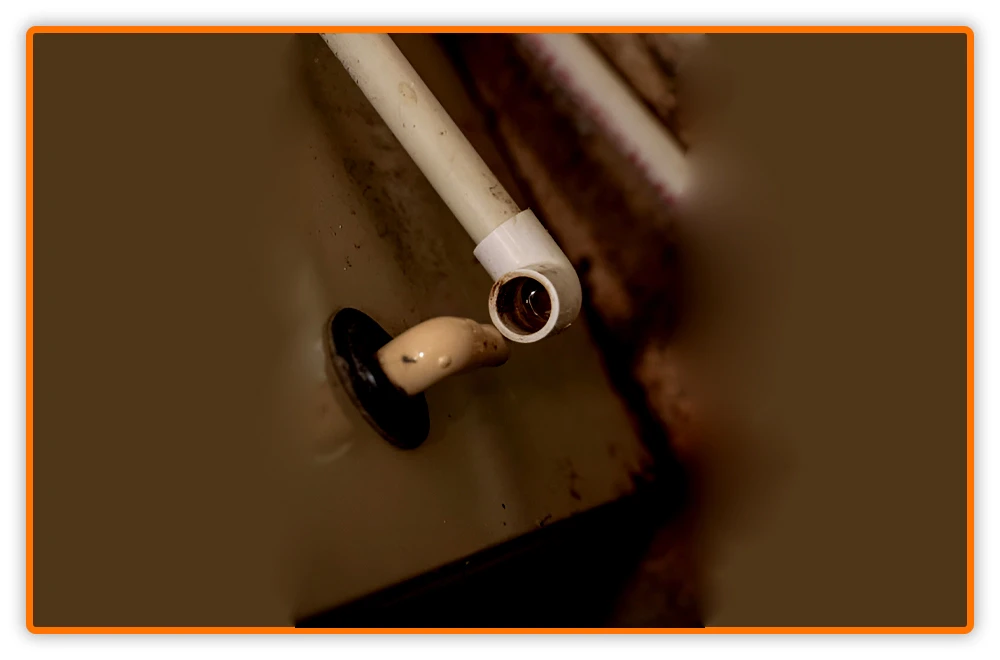
Air conditioners pull moisture from the air, which turns into water that needs to flow outside. If the drain gets blocked, it can cause problems like shutting down the system to avoid water damage.
Common Signs of a Clogged Drain
- The air conditioner turns off by itself.
- Water collects around the AC unit or at the base of your indoor unit.
- The humidity in your home feels too high.
Prevention and Maintenance Tips for Clogged Drain
- Regular Checks: Regularly check the drainage area for debris and algae. I always make it a habit to check mine monthly, especially during the summer when the AC is running more often.
- Clear Surroundings: Keep the area around the drain line exit free from leaves, dirt, and other debris. In one of my client’s homes, clearing the area around the drain line exit fixed their clogging issue.
- Clean the Drain Pan: Periodically clean the drain pan to stop it from overflowing. I once showed a friend how to do this, and it prevented their AC from shutting down unexpectedly.
DIY Maintenance Guidance for Clogged Drain
- Turn Off Power: Turn off the AC unit’s power before any maintenance to stay safe.
- Clear Debris: Use a wet/dry vacuum to clear debris from the outside drain line. I’ve done this for my unit, and it works well for minor clogs.
- Flush the Drain: Flush the drain with a mild vinegar solution (one part vinegar to one part water) to clear out mild clogs and reduce algae growth. I recommend doing this every few months; it’s an easy and effective way to maintain the drain line.
When to Call a Professional for Clogged Drain
- If cleaning doesn’t fix the drainage issue.
- If the drain line is badly damaged or keeps clogging, and home fixes don’t work.
- If moisture problems continue even with regular upkeep.
In my experience, keeping the drain line clear is key for your AC’s performance. Regular checks and simple maintenance can stop bigger problems and keep your home comfy. If you’re unsure or if the problem continues, call a pro.
They have the tools and know-how to handle more complex issues. By sharing these tips and personal experiences, I hope to help you keep your AC running well and avoid common issues like a clogged drain.
Blocked or Clogged Registers
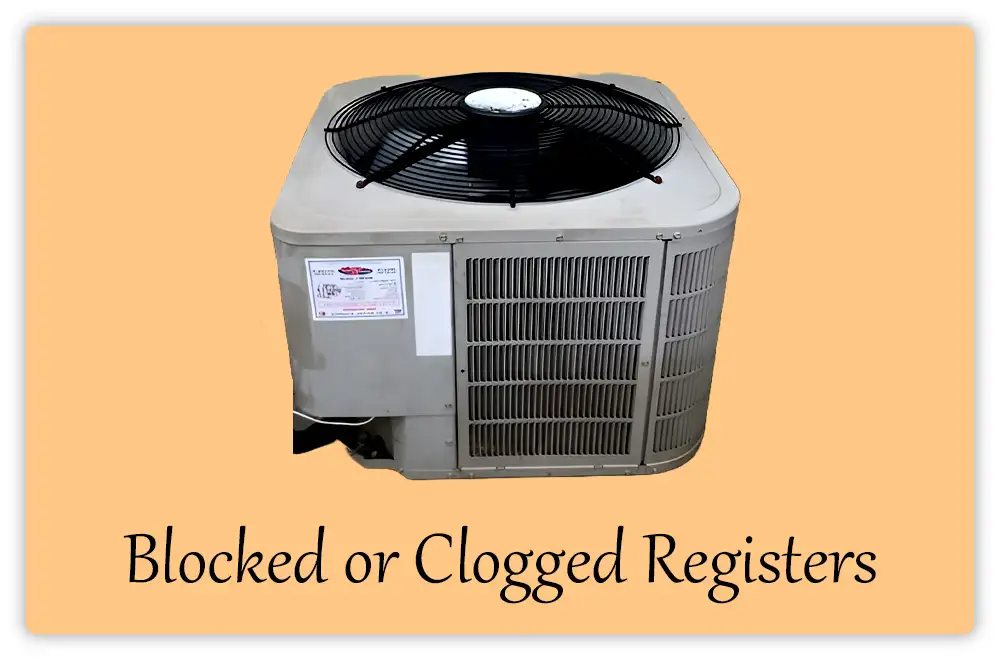
Blocked or clogged registers slow down airflow in your HVAC system, much like dirty air filters do. This can make your system less efficient and your home less comfortable, leading to higher energy costs. Dust buildup or objects blocking the vents are usually the cause.
Common Signs of a Clogged Register
- Less airflow from vents in some rooms.
- Dust buildup on the register grills.
- Different temperatures in various parts of your home.
Prevention and Maintenance Tips for Clogged Registers
- Regular Cleaning: Regularly vacuum and wipe the registers to clear dust. I make it a habit to clean mine every month to keep airflow smooth.
- Clear Surroundings: Keep furniture and curtains away from air vents. In one of my client’s homes, simply moving a heavy curtain away from the vent improved the room’s comfort.
- Check Room Setups: Often check and adjust room setups to ensure open airflow. I once rearranged my living room, and it greatly improved the airflow and overall comfort.
DIY Maintenance Guidance for Clogged Registers
- Remove and Clean Covers: Carefully take off the register covers and use a vacuum with a brush attachment to clean inside the ducts as far as you can reach. I’ve done this many times, and it’s an easy way to remove dust buildup.
- Wash Covers: Wash the register covers with soap and water to get rid of dust and grime. This keeps them looking nice and ensures better airflow.
- Regular Inspections: Regularly check the registers for blockages or dust buildup. I always check mine during my monthly cleaning routine.
When to Call a Professional for Clogged Registers
- If cleaning doesn’t improve the airflow or if you think there are blockages deeper in the ducts.
- When registers have a lot of damage or need fixes beyond just cleaning.
- If problems with airflow or air quality keep happening after cleaning the registers.
Bonus Tip: Double-check that vent covers are fully open. Sometimes, a closed vent is all that stands between you and cool comfort! I’ve had clients call me in a panic, only to find that the vent was accidentally closed.
In my experience, keeping the registers clear is key for good airflow and a comfy home. Regular cleaning and small adjustments can make a big difference. If you’re unsure or the problem continues, call a pro. They can help make sure your HVAC system runs well.
Dirty Condenser
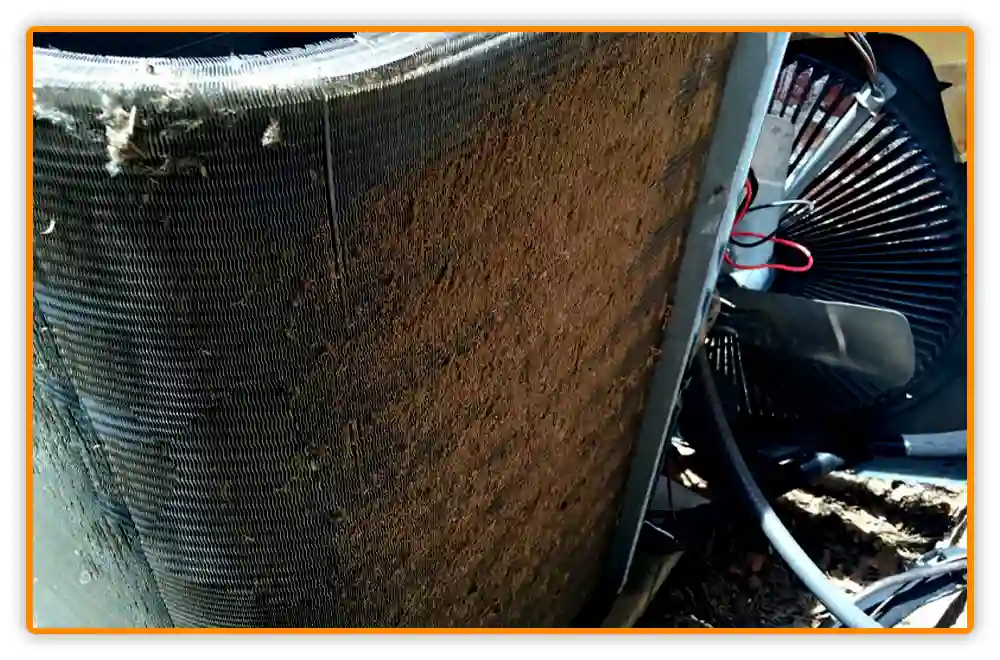
The condenser is in the outdoor part of your air conditioner. It helps cool your home by pushing warm air outside. When it gets dirty with debris and dirt, it makes the system work harder, like a clogged air filter. This uses more energy and cools less effectively.
Common Signs of a Dirty Condenser
- The air conditioner runs longer than usual and doesn’t cool efficiently.
- The outside part of the unit, especially near the condenser, gets very hot.
- Energy use goes up because the system needs more power to keep cool.
- The unit may make louder noises than normal because it’s under more strain.
Prevention and Maintenance Tips for Dirty Condenser
- Regular Checks: Regularly check the condenser for debris and buildup. I always look at mine every few weeks, especially after a storm.
- Clear Surroundings: Keep the area around the condenser clear of plants, leaves, and debris for good airflow. Once, I found a client’s condenser covered with leaves. Clearing them improved the AC’s performance instantly.
- Yearly Professional Check-Up: Schedule a yearly professional check-up to keep it working well. I recommend this to all my clients for peace of mind and efficient operation.
DIY Maintenance Guidance for Dirty Condenser
- Turn Off Power: Make sure the power to the AC unit is off before starting any maintenance to avoid accidents.
- Remove Debris: Gently take away any visible debris by hand or with a soft brush. I’ve done this many times, and it’s a simple but effective way to keep the condenser clean.
- Clean with Water: Use a garden hose to carefully clean dust and small particles from the condenser coils, being careful not to bend the fins. This step is essential. I once helped a neighbor do this, and it made a big difference in their AC’s cooling efficiency.
When to Call a Professional for Dirty Condenser
- If a simple cleaning doesn’t improve the condenser coils’ performance and they are still very dirty, it’s time to call a pro for help.
- If you see any damage to the condenser fins or coils when you check them.
- When the AC unit still doesn’t work well after you clean it, there might be a bigger mechanical problem.
In my experience, keeping the condenser clean is key for your AC’s efficiency. Regular maintenance and a bit of care can stop many common problems. If you’re ever in doubt or the problem continues, call a pro. They can provide the expertise needed to keep your AC running well. Sharing these tips, I hope to help you maintain your AC and enjoy a cool, comfy home.
Electrical Issues for AC not Blowing Cold Air
Learn how issues with your tripped circuit breaker and electricity can keep your AC from blowing cold air.
Tripped Circuit Breaker
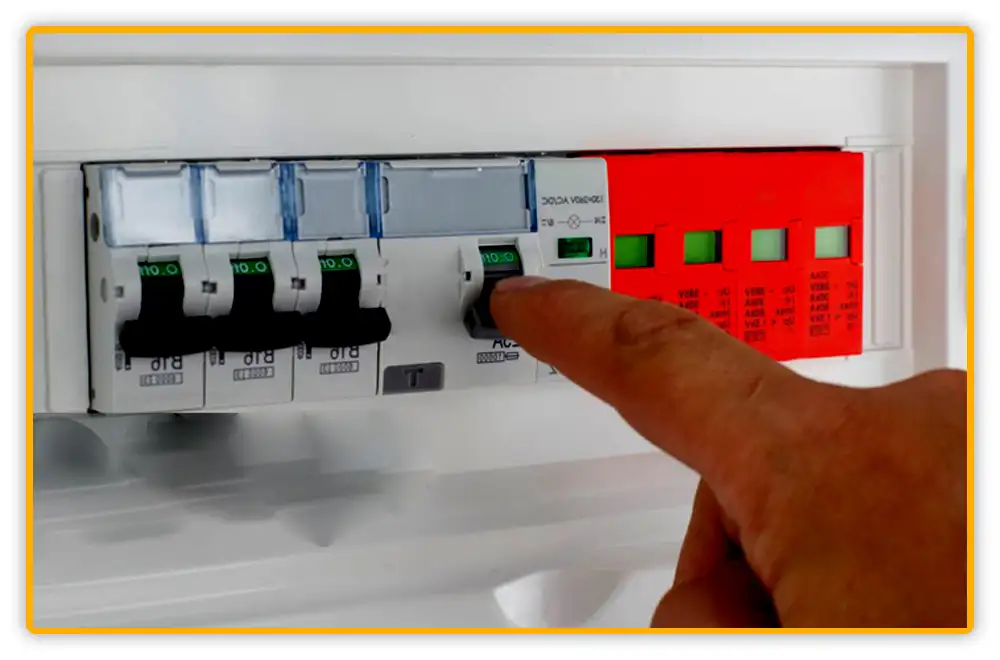
If your air conditioner isn’t turning on, it might be due to a tripped circuit breaker. Here’s a simple guide to help you fix the issue and prevent it from happening again:
Quick Steps to Reset Your Breaker
- Locate Your Electrical Panel: This is usually found in your basement, garage, or utility room. I remember having to guide a friend to their panel over the phone once—it’s often in a less obvious place!
- Find the Right Breaker: Look for a label that says “AC” on your electrical panel. If it’s switched to “OFF” or in the middle, it’s tripped.
- Flip the Breaker: Carefully flip the breaker to the “OFF” position first, then turn it back to “ON.” This should reset your air conditioner’s power. I’ve done this many times, and it usually does the trick.
Why Did This Happen?
Your air conditioner has two parts: one inside your home and one outside. These parts work together to keep your home cool. Sometimes, sudden increases in electricity or using too much power at once can cause the circuit breaker to turn off, stopping your air conditioner. I’ve seen this happen on very hot days when everyone’s AC is running full blast.
What If It Doesn’t Work?
If resetting the breaker didn’t solve the problem, try these steps:
- Check the Thermostat: Make sure it’s set to cool and the temperature is lower than the room. Once, a simple thermostat adjustment fixed a client’s problem instantly.
- Inspect the Filter: A clogged filter can cause your AC to work harder and trip the breaker. Clean or replace it if needed. I’ve had this issue myself; cleaning the filter made a big difference.
Still No Luck?
It might be time to call a professional, especially if you notice strange noises, smells, or if the breaker trips again. I’ve had to call in help a few times when the problem was more complicated.
Keep Your AC Running Smoothly
- Routine Checks: Often check and clean your AC filter. Have it checked by a professional every year. This regular maintenance can prevent many issues.
- Surge Protectors: Think about using a surge protector to keep your AC safe from sudden increases in power. I always recommend this to my clients for extra protection.
In my experience, a tripped circuit breaker is common but usually easy to fix. Regular maintenance and keeping an eye on your AC’s settings can help it run smoothly. If you run into trouble, call a professional. They can ensure everything is working correctly and safely.
Electricity and AC Performance
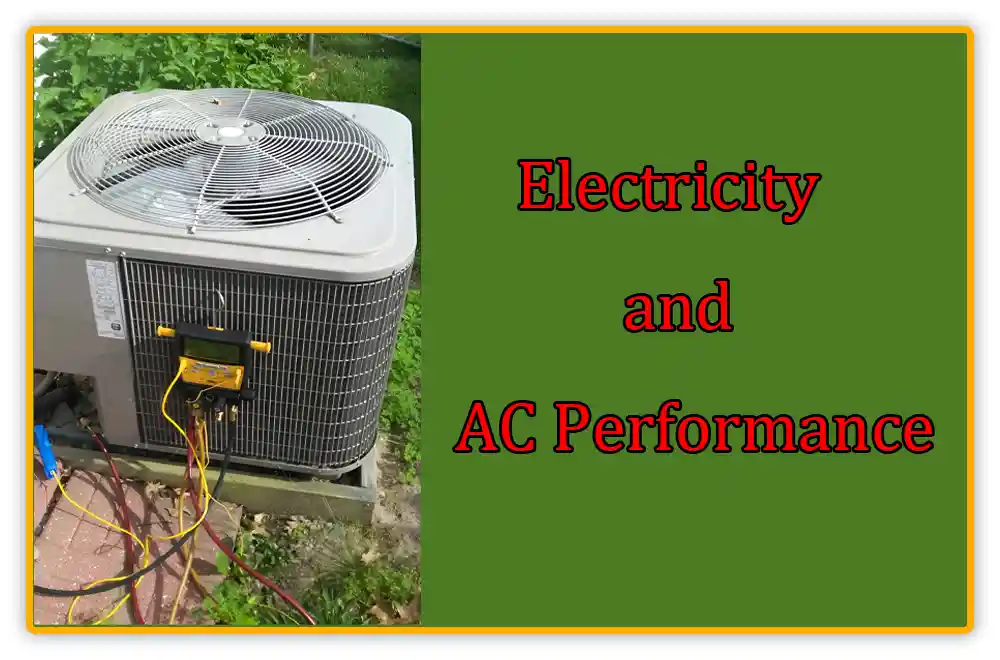
Electricity is crucial for your air conditioner’s performance. Without stable power, your AC might run but not cool your home well. Over the years, I’ve seen how electrical issues can affect AC performance in many homes.
Common Electrical Issues Affecting AC Performance
- Power Surges: Sudden electricity increases can damage your AC parts. I remember a client whose AC kept shutting off due to power surges. Installing a surge protector fixed their problem.
- Faulty Wiring: Poor or old wiring can cause inconsistent power supply to your AC. In one of my inspections, I found that a homeowner’s AC wasn’t cooling because of frayed wires. Fixing the wiring restored the AC’s performance.
- Inadequate Voltage: If your home doesn’t provide enough voltage, the AC can struggle to run well. I once had a client whose AC wasn’t getting enough power because their electrical panel couldn’t handle the load.
Signs of Electrical Problems
- Frequent Tripping: If your circuit breaker trips often when the AC is running, it’s a sign of electrical issues.
- Burning Smell: A burning smell from the AC unit could indicate electrical problems. I had a client who ignored this sign, and it led to a more serious repair later.
- Inconsistent Cooling: If your AC cools unevenly, electrical issues might be the cause.
Prevention and Maintenance Tips
- Regular Inspections: Have a pro inspect your AC’s electrical connections regularly. I tell my clients to get an annual check-up to catch issues early.
- Surge Protectors: Use surge protectors to protect your AC from power surges. They’re a small investment that can save you from big repair bills.
- Upgrade Wiring: If you live in an old home, upgrade the wiring to support modern appliances, including your AC.
My Personal Experience
In my home, I’ve seen how crucial stable electricity is for AC performance. One hot summer, my AC started tripping the breaker often. After checking, I found that the power draw was too high for my old wiring. Upgrading the electrical panel fixed the issue and made my home more efficient.
Electricity is the lifeblood of your air conditioner. A stable and adequate power supply keeps your AC running smoothly and your home comfortable. If you suspect electrical issues, call a professional. They can find and fix problems affecting your AC’s performance.
Read More: Are Air Purifiers a Waste of Money?
Mechanical Issues for AC not Blowing Cold Air
When your air conditioner isn’t blowing cold air, it could be due to a few mechanical issues. Here’s a quick look at some common problems like leaky ducts, a freezing air conditioner, and a broken fan. Let’s find out how to identify and fix these issues.
Leaky Ducts
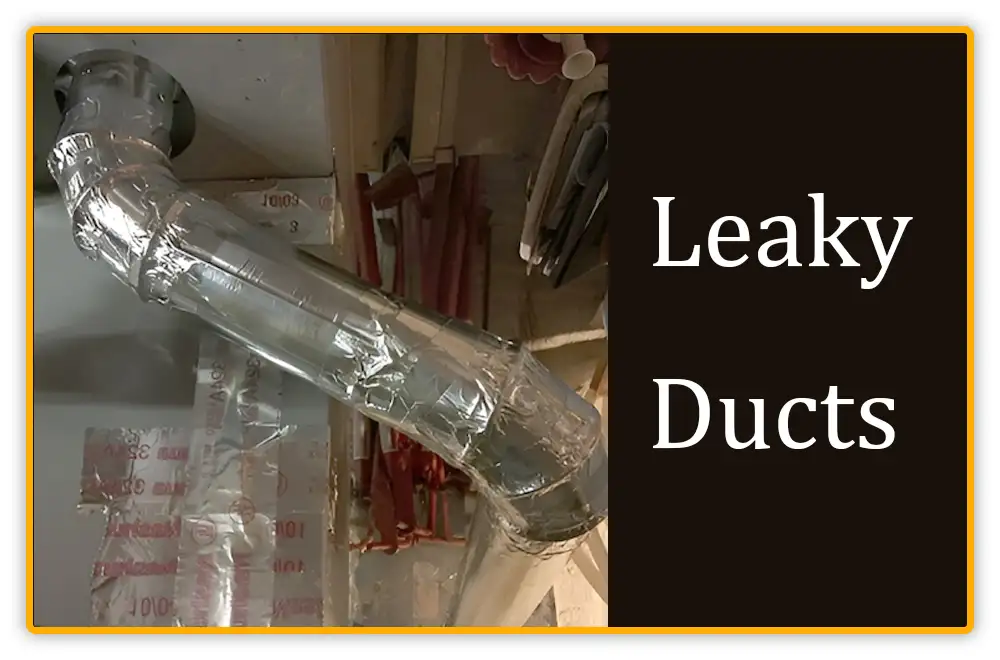
If your house is still hot while the air conditioner is on, you might have leaky ducts. Here’s a simple guide with advice from the EPA and tips from ASHRAE, along with my personal experience.
Find the Problem
If you have high energy bills and some rooms are warmer than others, your ducts might be leaking. The EPA says to also look for extra dust or pests as signs you might need to check your ducts. I once helped a client who noticed their energy bills skyrocketing, only to find out their ducts had several leaks.
Inspect Your Ducts
Go to your attic or basement to check your ducts for any damage or gaps. ASHRAE emphasizes the importance of well-sealed and insulated ducts to keep them working right. In my own home, I found a significant gap in the ductwork in the basement. Sealing it improved the cooling efficiency noticeably.
Seal the Leaks
Fix any leaks in your ducts with duct tape or mastic sealant. ASHRAE notes that sealing them well stops air loss and makes your system work better. I remember sealing a leak in my attic with mastic sealant, and it made a huge difference in how evenly my home cooled.
Call a Professional
If you see mold, pests, or big damage, the EPA and ASHRAE recommend getting a professional. They know the rules to make sure your HVAC system is safe and works well. I’ve had to call in professionals for major repairs, and their expertise ensured the job was done right.
Regular Checks
It’s good to check your ducts often to catch leaks early. This keeps them working well and saves money. I regularly inspect my ducts every few months, and it has helped me avoid bigger issues down the line.
Following these steps can help you keep your air conditioner working well and your home cool and comfortable. In my experience, taking the time to inspect and maintain your ducts pays off in better cooling and lower energy bills. If you’re unsure or the problem persists, calling a professional is the best way to ensure your system is in top shape.
Conclusion
If your air conditioner is not blowing cold air but running, these steps should help restore its functionality. Keeping your AC running well is simple. Check it often, clean as needed, and get help for big problems. Stay cool and save money by taking care of your air conditioner.
I’ve learned that regular maintenance can prevent many issues. One summer, my AC stopped cooling. After checking, I found the condenser was covered in debris. Cleaning it brought back the cool air and saved me from a costly repair.
Is your air conditioner not blowing cold air but running? We can help! Email us at info@homelysolve.com for quick solutions.
By taking care of your AC, you can keep your home comfortable and your energy bills low. Remember, a little maintenance goes a long way. If you need help, don’t hesitate to reach out. Stay cool and enjoy the comfort of a well-maintained AC.
Read More: Canopy Humidifier Review
FAQ
Why isn’t my ac blowing cold air ?
Your AC may not blow cold air mainly due to leaking or low refrigerant. Other common issues include dirty filters, a faulty compressor, or a frozen coil. Check the thermostat and clean filters first; if problems persist, seek professional help.
How to fix Low refrigerant in AC unit ?
If your AC unit has low refrigerant, start by finding and fixing any leaks. Then, call a trained technician to safely add the right amount of refrigerant. Handling refrigerants can be risky, so it’s important to get help from a professional.
How long after changing air filter will ac work ?
Changing the air filter is routine work; there’s no need to wait to use it after changing the filter. If your AC still isn’t cold after changing the filter, it might be low on refrigerant, have a problem with the condenser, or have another mechanical issue. In that case, it’s best to call a professional for help.

